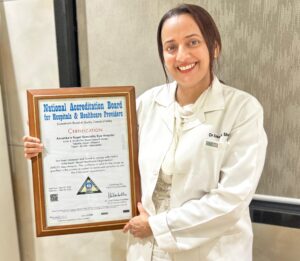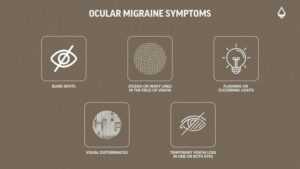
Anushka Super Speciality Eye Hospital
Call: 90044 44422 / 99213 44422 | Timings : 8.30 a.m to 5.30 p.m (Mon-Sat) | Add: Shri Swami Samarth Soc, Kaneri Dhamankar Naka, Bhiwandi




Accredited for Quality Care
Nutrition in Eye Health: Essential Nutrients and Their Best Sources
anushka
20 August 2025
Maintaining healthy eyes is not just about regular check-ups or wearing protective glasses. What we eat plays a vital role in preserving our vision and reducing the risk of eye diseases such as cataracts, glaucoma, and age-related macular degeneration (AMD). A diet rich in essential nutrients supports the eyes by providing antioxidants, improving circulation, and protecting delicate eye tissues from damage.
Why Nutrition Matters for Eye Health?
The human eye is a highly complex organ that relies on vitamins, minerals, and antioxidants to function properly. Poor nutrition can accelerate oxidative stress, inflammation, and degenerative eye conditions. Research shows that certain nutrients can:
- Protect against age-related macular degeneration (AMD)
- Lower the risk of cataracts
- Maintain healthy corneal and retinal tissues
- Improve night vision and overall visual performance
Key Nutrients for Eye Health and Their Sources
1. Vitamin A: The Vision Vitamin
Vitamin A is essential for maintaining the cornea and producing rhodopsin, a pigment in the retina that helps us see in low light. Deficiency can lead to night blindness and even permanent vision loss.
Best Sources:
- Carrots
- Sweet potatoes
- Spinach
- Kale
- Liver
- Pumpkin
2. Vitamin C: The Cataract Fighter
A powerful antioxidant, Vitamin C protects the eyes from free radicals and oxidative stress, which can damage the lens and retina. It also helps maintain blood vessels in the eyes.
Best Sources:
- Citrus fruits (oranges, lemons, grapefruit)
- Kiwi
- Strawberries
- Broccoli
- Bell peppers
- Guava
3. Vitamin E: The Antioxidant Shield
Vitamin E prevents oxidative stress from damaging eye cells, especially in the retina. Studies suggest that Vitamin E may slow the progression of AMD and cataracts.
Best Sources:
- Almonds
- Sunflower seeds
- Hazelnuts
- Wheat germ oil
- Avocados
4. Lutein and Zeaxanthin: The Eye’s Natural Sunglasses
These carotenoids are concentrated in the retina and macula, filtering harmful blue light and protecting against AMD and cataracts.
Best Sources:
- Kale
- Spinach
- Collard greens
- Corn
- Peas
- Egg yolks
5. Zinc: The Vision Protector
Zinc plays a crucial role in transporting Vitamin A from the liver to the retina to produce melanin, a protective pigment. Zinc deficiency can lead to night blindness and increased risk of AMD.
Best Sources:
- Oysters (richest source)
- Beef
- Pumpkin seeds
- Chickpeas
- Lentils
6. Omega-3 Fatty Acids: The Dry Eye Remedy
Omega-3s support the health of the retina and may prevent dry eye syndrome by improving tear production. They are also beneficial for reducing the risk of diabetic retinopathy.
Best Sources:
- Fatty fish (salmon, mackerel, tuna, sardines)
- Flaxseeds
- Chia seeds
- Walnuts
- Fish oil supplements
7. B Vitamins: The Eye Stress Relievers
B-complex vitamins, especially B6, B9 (folate), and B12, reduce homocysteine levels in the blood, lowering the risk of AMD. Vitamin B2 (riboflavin) also protects against cataracts.
Best Sources:
- Eggs
- Dairy products
- Whole grains
- Bananas
- Leafy greens
- Legumes
8. Beta-Carotene: The Precursor to Vitamin A
Beta-carotene is a carotenoid that the body converts into Vitamin A. It works as an antioxidant, protecting eye cells from free radical damage.
Best Sources:
- Carrots
- Apricots
- Butternut squash
- Mangoes
9. Selenium: The Antioxidant Booster
Selenium works with Vitamin E to prevent oxidative stress and strengthen eye tissues.
Best Sources:
- Brazil nuts
- Sunflower seeds
- Brown rice
- Mushrooms
- Tuna
10. Anthocyanins: The Vision Enhancers
These plant-based antioxidants found in deeply pigmented fruits support blood flow to the retina and reduce eye fatigue.
Best Sources:
- Blueberries
- Blackberries
- Cherries
- Purple sweet potatoes
- Red cabbage
Daily Diet Tips for Better Eye Health
To keep your eyes healthy for years to come, consider these practical tips:
- Eat the Rainbow: Include colorful fruits and vegetables to ensure a wide variety of antioxidants.
- Choose Healthy Fats: Add omega-3-rich fish or plant-based seeds to reduce dry eye symptoms.
- Go Green: Dark leafy greens like kale and spinach should be a staple for lutein and zeaxanthin.
- Stay Hydrated: Proper hydration keeps the eyes moist and reduces irritation.
- Limit Processed Foods: High sugar and trans fats can accelerate oxidative stress and increase the risk of diabetic eye disease
Lifestyle Habits That Support Nutrition for Eye Health
- Quit Smoking: Smoking reduces antioxidants in the eyes, raising the risk of cataracts and AMD.
- Protect Your Eyes from UV Rays: Even with good nutrition, sun damage can harm the eyes.
- Regular Eye Check-ups: Nutrients are preventive, but regular check-ups catch issues early.
- Balanced Diet + Supplements: If diet is insufficient, supplements like AREDS2 (Age-Related Eye Disease Study) formulas can support eye health.
Conclusion
Nutrition is a powerful tool in protecting and preserving eye health. Vitamins A, C, and E, along with lutein, zeaxanthin, zinc, omega-3 fatty acids, and other antioxidants, form the foundation of healthy vision. By incorporating nutrient-rich foods such as leafy greens, citrus fruits, fatty fish, nuts, and colorful vegetables into your diet, you can significantly lower your risk of eye diseases and maintain clear vision for years to come.
Taking care of your eyes starts on your plate. Small dietary changes today can have a lasting impact on your vision tomorrow.
Recent Posts


